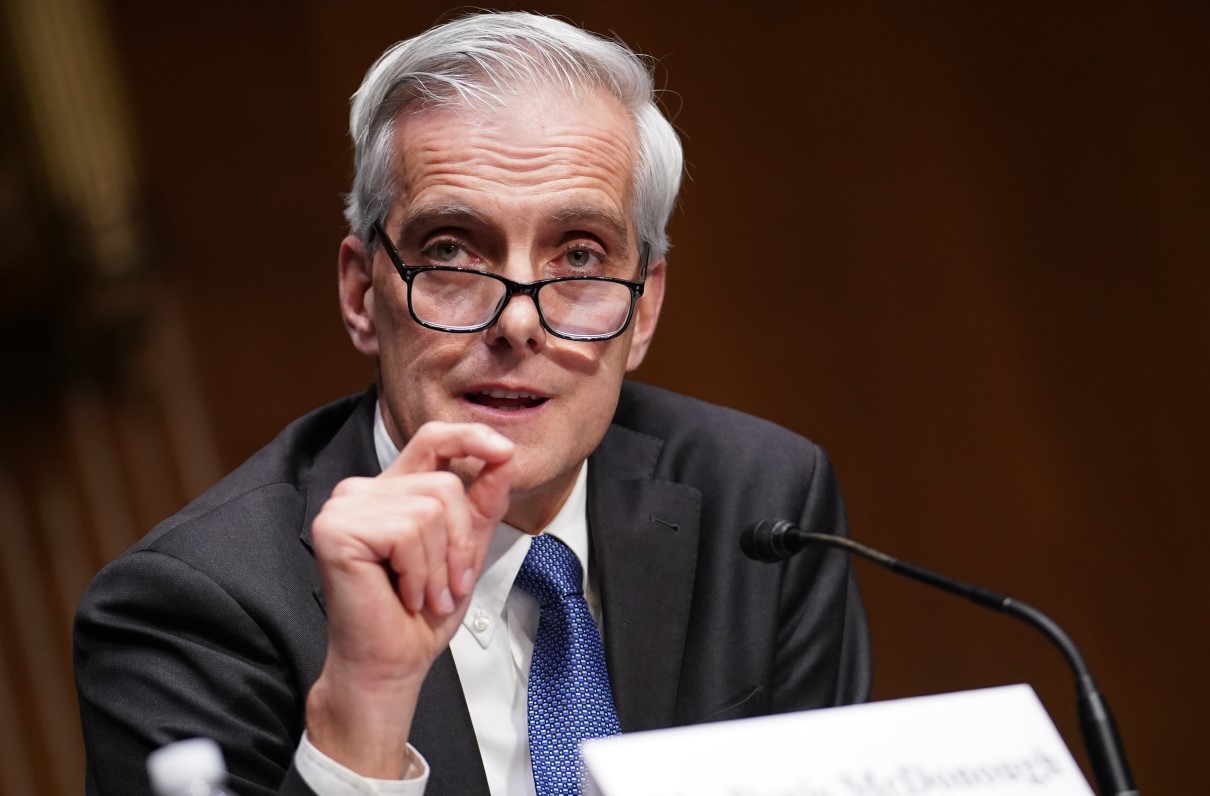The new VA secretary has been hard at work in his first 45 days in office assessing the department’s transformation efforts and laying a path forward to get veterans into the system and create welcoming, safe facilities.
“I promised to be a fierce advocate for veterans at all stages of their lives,” Secretary Denis McDonough told lawmakers during a three-hour House Committee on Veterans’ Affairs hearing March 25. “This includes greater outreach to those most at risk of poor health, suicide, and other issues, especially veterans within historically underserved populations.”
McDonough who is all about restoring faith and trust with veterans, spoke extensively about his plans for doing so and what Congress can expect from him and the department over the coming months. He said he recognizes the tough job before him but spoke about how inspirational it has been during his short time in office.
The rapid enactment of essential legislation like the American Rescue Plan Act of 2021 and the SAVE LIVES Act will help his department provide health care and economic relief to veterans impacted by the pandemic, and gives the department the authority to provide COVID-19 vaccinations to veterans regardless of their enrollment status with VA health care, as well as to their spouses and their caregivers.
[RELATED: How the VA Plans to Spend $17 Billion in New COVID Relief Money]
Four fundamental principles serve as a guide for the secretary’s vision for the future. The VA will:
- Serve as the premier advocate for veterans.
- Provide timely access to resources and services.
- Ensure veteran outcomes drive the department’s actions.
- Seek excellence in all it does to leverage the diversity of veterans, the organization, and the country.
The pandemic’s impact on veterans has been broad, from delivery of health care to benefit services. Veterans have canceled or delayed mental health and other critical health care appointments; because of this, McDonough anticipates a surge in demand for care and services, expecting veterans to be sicker because they delayed medical care this past year.
Compensation and pension exams and disability claims processing backlogs also increased during this time. Some of the claims processing backlogs were due to reduced operations at the National Personnel Records Center because of the COVID-19 restrictions and employees not being vaccinated.
Mental health and suicide prevention were top of mind for lawmakers at the March 25 hearing, and at a hearing the previous day with members of the Senate Committee on Veterans’ Affairs. Members emphasized the importance of speedy implementation of the Commander John Scott Hannon Veterans Mental Health Care Improvement Act, also known as the Hannon Act, and other mental health legislation signed into law last year to help improve veterans’ health and well-being.
[RELATED: Here’s What the Flurry of 2020 Veterans Legislation Means to You]
In a written statement for the Senate hearing, MOAA highlighted several gaps requiring a greater sense of urgency to resolve. While VA’s progress in improving health care services is promising, many of the challenges facing veterans prior to the crisis have been exacerbated by the pandemic.
Big gaps still exist in how the VA communicates with and responds to the needs of veterans, their family members, and caregivers. Difficulties in navigating and accessing the health care system and community care services create confusion and frustration. And, more importantly, how the department delivers the kind of wraparound services and continuity of care needed for veterans suffering from mental health issues or exposed to traumatic injuries remains problematic.
MOAA urged Congress and the VA to provide the necessary oversight and ongoing transparency in implementing the Hannon Act and for the VA to fully capture lessons learned and implement best practices from the pandemic related to mental health care and suicide prevention to ensure these lessons are institutionalized and not forgotten.
McDonough has committed to full openness and transparency on his watch. He is focused on many other priorities important to veterans, their families, Congress, and veterans organizations like MOAA, including:
- Improving cultural competency and evidenced-based treatment among community providers.
- Implementing a process for routinely considering new data on the science of toxic exposures and building the case for presumption for veteran claims.
- Improving collaboration between the VA and DoD in implementing the electronic health record; addressing policies and procedures surrounding handling of claims for military sexual trauma, assault, and harassment and caring for the victims; and investing in research and sharing of information related to veterans’ service to ensure veterans receive the health care and benefits faster to meet their needs.
MOAA is grateful to work collaboratively with Congress and the VA to identify the resources the secretary needs to execute his vision, and in implementing the Hannon Act and other substantial transformative legislation aimed at restoring veterans’ trust and confidence in their VA.
MOAA Knows Why You Serve
We understand the needs and concerns of military families – and we’re here to help you meet life’s challenges along the way. Join MOAA now and get the support you need.

